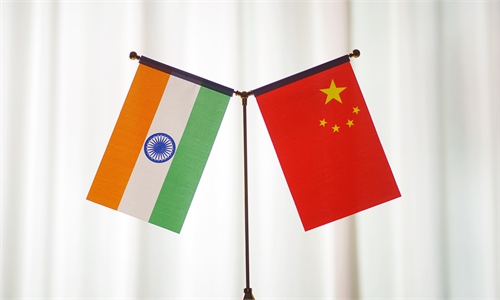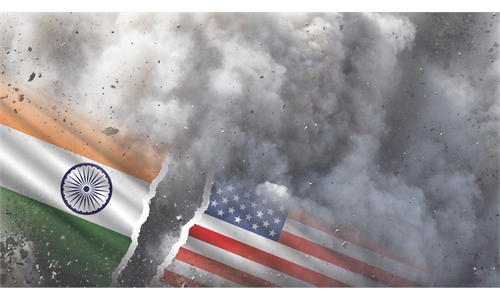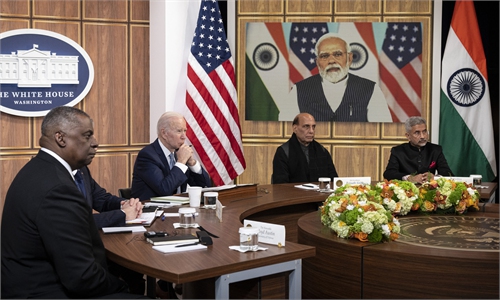Opinion: India withstood US blackmail over Russia sanctions. What it can learn from that?

Workers walk past oil barrels at a filling station in Chennai, India on February 24, 2022. Photo: AFP
India appears to have successfully foiled an attempt by the US to blackmail the South Asian country into abandoning its energy trade with Russia and joining in the US-led sanctions against Moscow. Having repeatedly threatened with "significant and long-term" consequences if New Delhi aligns with Russia, US officials, in a major shift of tone at high-level US-India meetings, have seemingly given India a green light on its purchase of Russian energy.
At a press briefing on Monday following what has been described as a "constructive and direct" call between Indian Prime Minister Narendra Modi and US President Joe Biden, White House Press Secretary, Jen Psaki, said that Indias energy imports from Russia were not violating US sanctions, according to Indian news outlet NDTV.
Asked about whether Biden was seeking a pledge from Modi that India would not increase oil purchases from Russia, Psaki said that "I will let Prime Minister Modi and Indians speak on that. It is only 1 to 2 percent at this point of time. They import 10 percent from the United States. It is no violation of any sanctions or anything along those lines."
Meanwhile, China News Asia reported that Biden did not make major demands from India and a senior official of the administration said that "we have been very clear that we have been able to ban oil, gas and coal imports from Russia, but other countries have to make their own choices."
Obviously, that is a complete lie. Instead of allowing other countries to make their own choices, Washington has spared no efforts to pressure, threaten and blackmail other countries, including India and China, to follow its sanctions against Russia.
Just last week, Brian Deese, Director of the White House National Economic Council, explicitly threatened India over its purchase of Russian oil. The US told India that the consequences of a "more explicit strategic alignment" with Moscow would be "significant and long-term," Deese said, according to Bloomberg.
So, what made the US back-paddle on its blackmailing tactics against India? Certainly, New Delhis firm standing in the face of US pressure helped. But the decisive factor must be the US geopolitical calculation that still needs India as a pawn against what Washington considers to be its main rival, China. India may very well have got a free pass because of China.
There are many ways New Delhi could look at this issue.
First, and probably the one approach most Indian nationalists will likely subscribe to, is that India's hostile anti-China approach has paid off. This may be true, but it is far from telling the full story. Given its multifaceted containment strategy against China, Washington would certainly welcome a major country like India to be hostile against China as it helps with its containment.
However, joining the likes of Australia and Lithuania, who are competing to be the US attack dog against China, would not impress Washington. On the contrary, it would be discarded just as a tool or cannon fodder, at the most. If India abandons its own national interests to show complete loyalty it will not get Washington to back off from its blackmail.
That brings us to the second and right approach where New Delhi should look at its diplomatic victory in both keeping the lights on for Indians, quite literally, while avoiding a complete fallout with Washington. This shows its ability to maintain an independent foreign policy in the face of pressure from the world's sole superpower.
Since the outbreak of the Russia-Ukraine conflict, New Delhi has refused to kowtow to the US and the West in their reckless sanctions against Russia and instead maintained a neutral position. It even defied Western sanctions by looking to increase its purchase of Russian energy.
India also kept close communication with China, likely due to the refusal by both countries to take sides in the Russia-Ukraine conflict and the power game between the West and Russia. In the first high-level bilateral visit between China and India since December 2019, Chinese State Councilor and Foreign Minister, Wang Yi, visited New Delhi in late March, and held extensive talks about the need to keep bilateral ties stable and work jointly to safeguard regional peace and development.
It is very plausible that Washington saw positive developments in China-India relations and did not like what it saw. For that reason, it decided to give New Delhi a free pass over Russia sanctions. It is also very clear that New Delhis independent foreign policy that allowed it to engage with all sides rather than blindly following Washingtons footsteps, paid off.
Obviously, China and India do not see eye to eye on some issues, including disputes at the border. However, as the world's two most populous countries and biggest developing nations, there are also many more areas where both sides have shared interests and could expand cooperation. What is best for India, China and the entire region is for New Delhi to keep that independent and flexible foreign policy and not be trapped by Washington.
The author is an editor with the Global Times. bizopinion@globaltimes.com.cn




